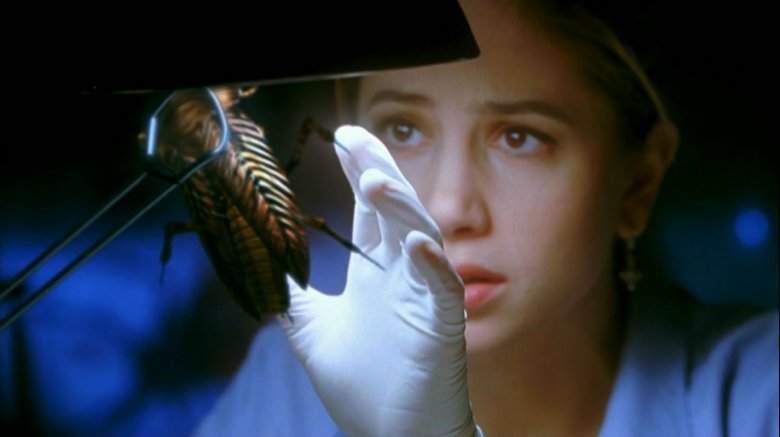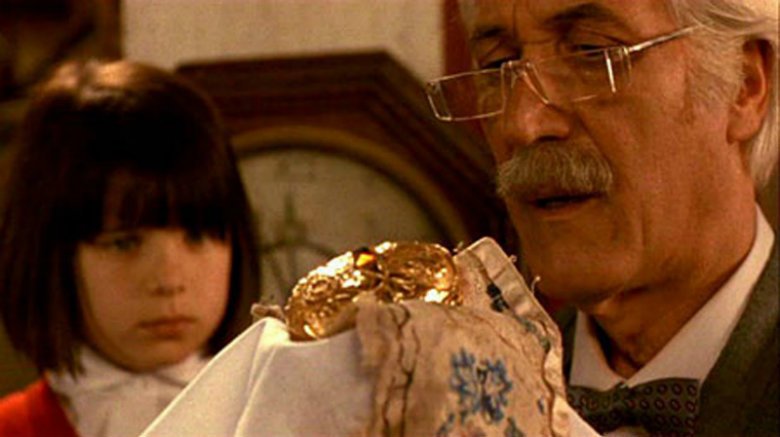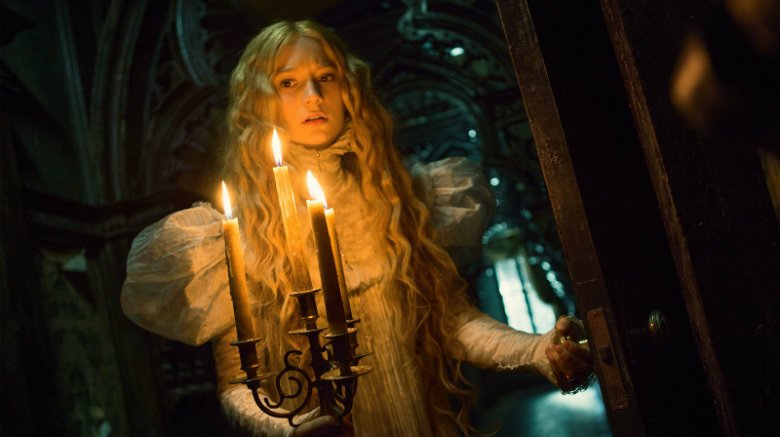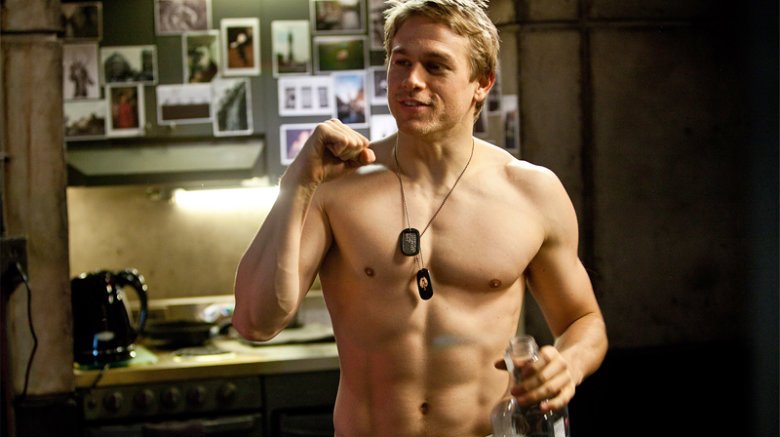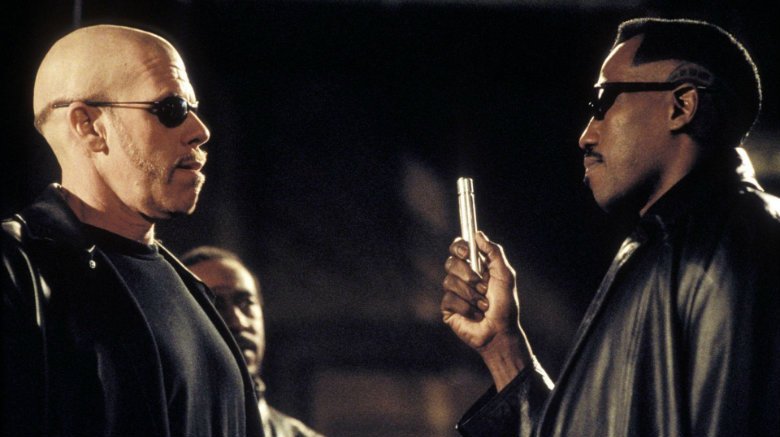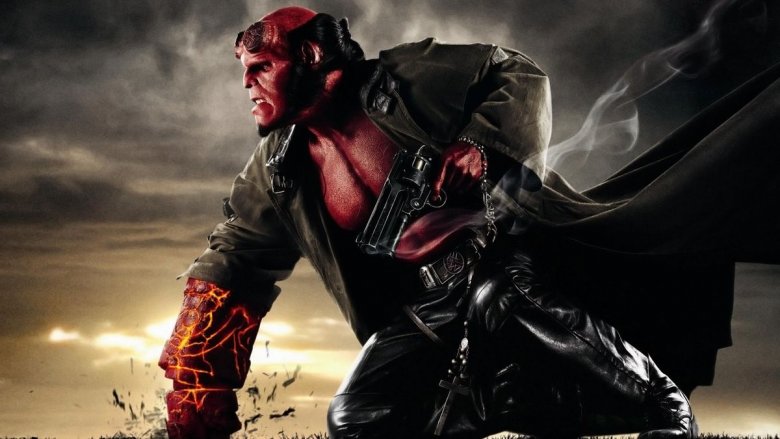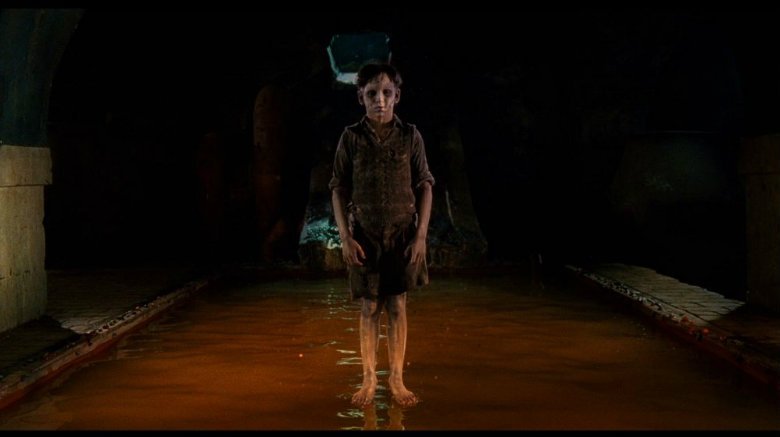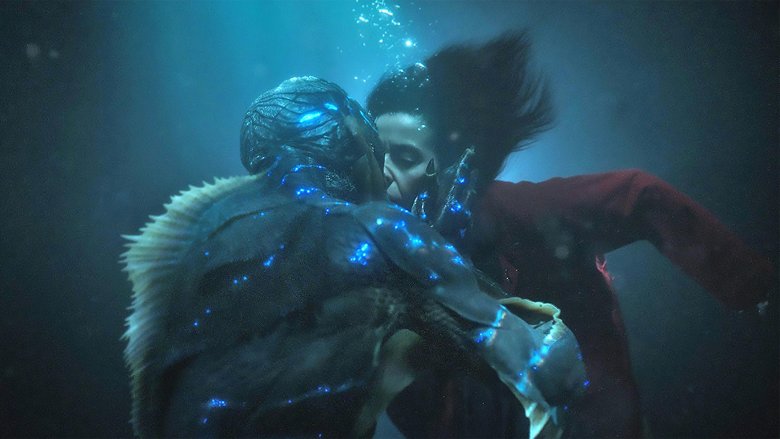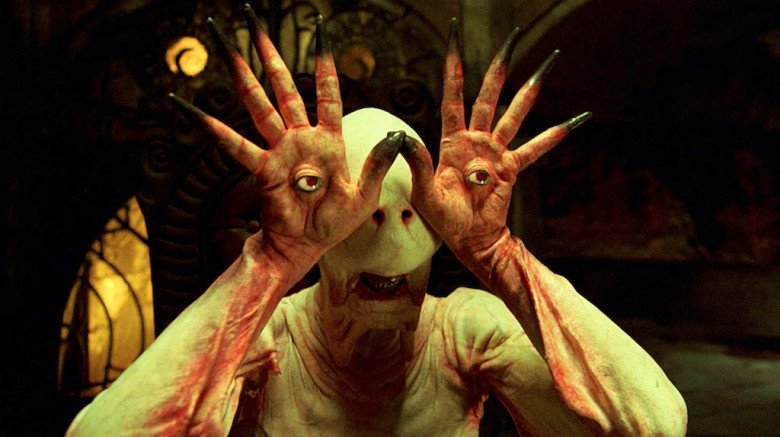Every Guillermo Del Toro Movie Ranked From Worst To Best
Over the course of more than a quarter century, Mexican director Guillermo del Toro has ranked as one of the most imaginative and visionary filmmakers of our time. Few can match his passion for cinema and across the span of an increasingly acclaimed filmography, del Toro's obsession with movie monsters has captured the hearts and minds of audiences and critics alike. Each of del Toro's films are instantly recognizable as one of his own, and few auteurs currently working in Hollywood can match the intricacy of his distinctive vision.
It took a long time getting there, but del Toro's work was finally rewarded by the Oscars in 2018 when The Shape of Water swept the board and won four Academy Awards, including Best Picture and Best Director. However, long before del Toro dived into the depths of inter-species love, the acclaimed director tackled a whole range of monster tropes that transcended typical notions of horror and fantasy. Join us as we rank all of Guillermo del Toro's movies from worst to best, singing the praises of each as we go.
Mimic (1997)
Anyone who's squeamish at the sight of bugs would do best to avoid Guillermo del Toro's first English-language movie, as Mimic is literally crawling with them. The story begins with entomologist Susan Tyler (Mira Sorvino) and her quest to rid New York City of the cockroaches that spread deadly diseases to the population. Deciding to fight fire with fire, Tyler and her husband Peter Mann (Jeremy Northam) genetically engineer new insects called the Judas Breed that are designed to feed on the infected bugs. Unfortunately, things take a dangerous turn as these new creatures evolve quicker than expected, gaining both the ability to mimic other organisms and a taste for human flesh.
While Mimic features the kind of detailed character design that del Toro would later become renowned for, his first venture into Hollywood was ultimately a bitter experience for the young filmmaker. The increased budget for this second feature helped him to realize his work better on a visual scale, but creatively, del Toro felt stifled by studio interference and has since disowned Mimic entirely. Taken on its own merits, though, Mimic is a fun and schlocky B-movie that's still worth a watch, even if it doesn't match up to Del Toro's later work.
Cronos (1994)
While most filmmakers tread somewhat carefully for their first feature, Guillermo del Toro delivered one of his most outlandish concepts for Cronos, a unique take on the vampire genre. The story follows elderly antique dealer Jesus Gris (Federico Luppi) who discovers an ancient artifact that grants eternal life. With the help of his eight-year-old granddaughter Aurora (Tamara Shanath), Gris tries to use the item's power for himself, but the immortal parasite that lives within attaches itself to his body and transforms him into a bloodthirsty creature whose life now revolves around death.
Originally written for Max Von Sydow, the role of Jesus Gris is unusual as older men rarely take center stage in film, but that's not the only surprise del Toro had in store for his debut. While it's somewhat rough around the edges and sometimes struggles to maintain a balance between horror and comedy, Cronos still showed much of the promise that the filmmaker would capitalize on later in his career. This Mexican sci-fi/horror hybrid still scored an impressive 90 percent on Rotten Tomatoes and is worth watching for some unforgettable scenes of both beauty and violence.
Hellboy (2004)
Back before it felt like new superhero movies were soaring into multiplexes daily, Guillermo del Toro lent his magic touch to the story of Hellboy. Played by longtime friend Ron Perlman, Hellboy is summoned to our plane of existence by forces of evil in the Third Reich, but is soon captured by the Americans who raise him as part of an elite secret defense team at the Bureau for Paranormal Research and Defense. Sixty years later, Hellboy and his allies face their greatest challenge yet when Grigori Rasputin (Karel Roden) fights to take control of the demon and use him to help rule the world.
Based on Mike Mignola's acclaimed comic book series, Hellboy was a breath of fresh air in a world of leather-bound superheroes. Del Toro fought to retain the spirit of the source material with the help of Perlman's surly take on the lead role. However, it seems as though the studio interference that plagued Mimic also played a role here, albeit on a smaller level. The general "weirdness" of the Hellboy comic is at odds here with the need to make the film relatable, although the odd moments of humor are a welcome addition that del Toro would expand on in the much improved sequel, Hellboy II: The Golden Army.
Crimson Peak (2015)
A haunted house movie. A gothic love story. A historical drama. For his ninth movie, Guillermo del Toro blurred the boundaries of genre more than usual with the story of Crimson Peak, which followed a dark love affair between Edith Cushing (Mia Wasikowska) and Thomas Sharpe (Tom Hiddleston). Swept away to Sharpe's creepy yet magnificent house, Cushing must face both the ghosts of the past and the very real threat that Thomas' sister Lucille (Jessica Chastain) brings to their lives.
Marketed as an outright horror movie, reception to Crimson Peak was more mixed than Del Toro had become accustomed to, although the film still earned a score of 71 percent on Rotten Tomatoes thanks to the gorgeous set design and unnerving visuals. While Crimson Peak matches neither the scares of Pan's Labyrinth nor the romantic highs explored in The Shape of Water, this gothic tale is a bold experiment that captured Del Toro's passion for penny dreadfuls with the style and sophistication that's typical of his work. Just like Cushing, your heart will be stolen too by Crimson Peak, which remains one of del Toro's more underrated films.
Pacific Rim (2013)
Combining his love of Japanese mecha and monster features, Guillermo del Toro's biggest blockbuster yet takes place during an ongoing battle between creatures called the Kaiju and the Jaegers, gigantic robots created by humanity to help protect the earth. Close to defeat, the heroes of Pacific Rim have no choice but to enlist the help of a former pilot (Charlie Hunnam) and a young trainee (Rinko Kikuchi) to turn the tide and help cancel the encroaching apocalypse.
While it's easy to dismiss the first Pacific Rim movie as a mindless blockbuster, the truth is that del Toro would never create something so simplistic. Yes, the action sequences often take precedence over the characters themselves, but the film is a technical marvel and the diversity of the cast was leagues ahead of any other movie released at the time. Del Toro has always had an eye for design, but in his hands, these giant creatures and robotic figures are imbued with far more personality than your standard monster flick. Sure, the legacy of Pacific Rim will never match some of del Toro's greater films, but fans would be foolish to overlook the auteur's most outright enjoyable movie yet.
Blade II (2002)
Four years after Wesley Snipes donned his prosthetic teeth and introduced the world to Blade, the supernatural Marvel hero returned for a second outing in 2002. Under the eyes of director Guillermo del Toro, the vampire hunter is pitted against a new threat of mutated creatures known only as the Reapers. To defeat them, Blade must agree to a truce with the vampires he has devoted his life to killing, reuniting with his former mentor Whistler (Kris Kristofferson) along the way.
Superhero sequels are tricky at the best of times and Blade's success was a huge surprise the first time around, so the sequel could have gone either way, particularly as del Toro had zero involvement with the franchise beforehand. Fortunately, del Toro used his experience on Cronos to expand the vampire mythology even further here, diving headfirst into the hedonistic underworld that Blade is forced to fight in.
Like Pacific Rim, Blade II lacks the finesse of Del Toro's smaller movies, but his underrated eye for action works exceptionally well here, elevating what could have been a dire entry in the franchise. It's just a shame that del Toro didn't stick around for Blade: Trinity, as the third chapter would have certainly benefited from his magic touch. Yes, Blade II only obtained a score of 57 percent on Rotten Tomatoes, but that's still a marked improvement on the 25 percent rating given to the subsequent film in the franchise.
Hellboy II: The Golden Army (2008)
Guillermo del Toro indulged his love of monster features once again in Hellboy II: The Golden Army, which remains the only sequel to one of his own films that he returned to direct. Dispensing with the backstory this time around, Hellboy II finds our hero caught up in a power struggle between humanity and the invisible realm as Prince Nuada (Luke Goss) breaks an ancient truce to wage war on our world. With the help of his friends at the Bureau for Paranormal Research and Defense, Hellboy steps up once again to save the Earth, but the conflict is more complicated than it first appears.
While the first Hellboy movie was an admirable addition to the superhero genre, The Golden Army is clearly the film that del Toro wanted to make all along. With the most lovable assortment of oddballs to hit the screen since the X-Men made their debut, Hellboy and his team really come into their own here, dazzling in both the innovative action sequences and hilarious moments of down time peppered throughout.
It's a shame, then, that The Golden Army was lost in the shuffle when it was released in the summer of 2008, as it was forced to compete against both Iron Man and The Dark Knight. However, while the former did kickstart a cinematic universe of its own and the latter remains one of the shining beacons of the genre, Hellboy II: The Golden Army retains the same appeal that Hellboy himself does a decade on, and it's still hard not to root for this plucky outsider.
The Devil's Backbone (2001)
Guillermo del Toro's definitive ghost story is set during the last days of the Spanish Civil War and stars Carlos (Fernando Tielve) as a ten year old boy sheltered in the Santa Lucia School for orphans. Confronted by the hostility of Jaime (Íñigo Garcés), the oldest of the children who live there, Carlos struggles to come to terms with his situation until he uncovers the secret of a ghost called Santi (Junio Valverde) who haunts the grounds. On the path to discovering how the boy died, even more secrets come to light that could threaten the lives of both Carlos and the other orphans too.
The Devil's Backbone is one of del Toro's most personal films and excels by balancing the scares with an emotional honesty that paints each character as a rounded individual. Despite the horrors that surround them, few members of the cast are innately good or bad. Instead, del Toro's script feels the pain of everyone involved, whether it be melodramatic confrontations or a pervading sadness that haunts the residents of the school. Both a creepy ghost story and powerful allegory for the politics of the time, The Devil's Backbone is easily one of del Toro's best movies to date and arguably forms the backbone for everything that came after.
The Shape of Water (2017)
Guillermo del Toro subverts the fairy tale tropes that Disney have commodified in recent years with his award winning masterpiece, The Shape of Water. Set in America circa 1962, del Toro's best English-language film stars Sally Hawkins as Elisa, a lonely mute woman who spends her days eating eggs and cleaning a government installation. However, her life is changed forever when she and a co-worker called Zelda (Octavia Spencer) discover a creature that's being abused by Michael Shannon's government operative, who plans to kill it once the experiments are over. With the help of her best friend Giles (Richard Jenkins), Elisa plans to release the creature (Doug Jones) out of captivity and falls in love with him along the way.
More than any other film he's made, The Shape of Water successfully blends del Toro's genre leanings and his romantic streak in one cohesive story that feels timeless thanks to his usually impressive production design and glorious performances from the lead cast. Everything from its use of color to the unique way it tackles communication helps The Shape of Water transcend its frankly bizarre subject matter to create something that even the Academy could get on board with. While the underdog message of the film is sometimes a bit too blunt in execution, The Shape of Water is a masterpiece nonetheless, and will continue to be discussed by critics and audiences alike for years to come.
Pan's Labyrinth (2006)
Just like The Devil's Backbone, Pan's Labyrinth revisits the ramifications of the Spanish Civil War, but here, both the horror and fantasy elements are heightened further as Ofelia (Ivana Baquero) ventures into a legendary underground kingdom. Convinced by the mythical Pan (Doug Jones) that she's a lost princess, Ofelia sets out to complete a trio of dangerous tasks while her pregnant mother (Ariadna Gil) lies bedridden and her stepfather (Sergi López) plots to destroy a nearby guerrilla uprising.
Scoring an impressive 95 percent rating on Rotten Tomatoes, Pan's Labyrinth is del Toro's highest-rated movie on the site and an undisputed triumph of filmmaking. Despite being filmed in Spanish, the movie broke out of the arthouse crowd and became a surprise hit worldwide, winning three Academy Awards for Best Art Direction, Best Cinematography and Best Makeup.
A spiritual successor to The Devil's Backbone, Pan's Labyrinth became del Toro's calling card and captured best the themes of innocence and fantasy that are threaded throughout his entire filmography. The film is both stunning and unnerving in equal measure, and it's hard to imagine del Toro ever producing another movie of this caliber, no matter how great his future films might be.
